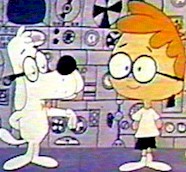

The Wayback
Machine
|
Bravo. In a world where such victories are few and far between, this one is truly worth savoring. Thanks to the Times for supporting the Web. [ DaveNet]My thanks as well, to Dave for making the call and to the Times for responding. Like Dave, I believe that stewardship of Web namespace is an almost sacred responsibility. Every hyperlink is an act of faith; the two-way Web is just a consensual hallucination made of many such acts. Like other illusions, for example the economy, this one can take a licking and keep on ticking -- up to a point. But consumer confidence in the link economy is tied to the expectation that a URL offered today will be a URL honored tomorrow, next year, or next decade. We thwart that expectation at our peril -- though I wonder for how much longer we will have the option to do so.
In a column from 2001 entitled Digital Archives I quoted an email from Mark Mitchell who wrote:
One of the nice things about a good old-fashioned library is that the librarians tend not to throw out the books. In another 20 years it may be easier to find math journal papers from 1973 than computer science articles from 2003, if we're not careful.
Maybe so. But maybe, whether we intend to or not, we'll wind up with just what Ted Nelson imagined. The vision for Xanadu was (and is) to create a distributed and non-erasable storage system that remembers and versions everything, and can enforce attribution and copyright. Is a permanent record possible? The Internet Archive suggests that it is. In 1995 I didn't believe that search engines would be able to keep up with the Web. Today I can't imagine that the Internet Archive -- or its successor -- won't.
A while back I noticed that Meerkat had captured two versions of an item posted by Dave Winer in response to an item of mine about SOAP toolkits. Dave responded:
Jon discovers an important feature of Internet 3.0. Real-time edits preserved for perpetuity. [ Scripting News]My own weblog is a palimpsest too, a fact which RSS readers plainly reveal when they redisplay edited items. In the case of a substantial update, I'll mark it as such. If I only correct a typo or misspelling, I won't -- but the infrastructure (RSS, Internet Archive) is increasingly likely to notice and version the change. The public record, as written on the Web, is less ephemeral than it seems. Nothing compels you to contribute to it. Once you do, nothing compels you to maintain your contribution. But even if you don't, the Web probably will.
Former URL: http://weblog.infoworld.com/udell/2003/04/07.html#a657